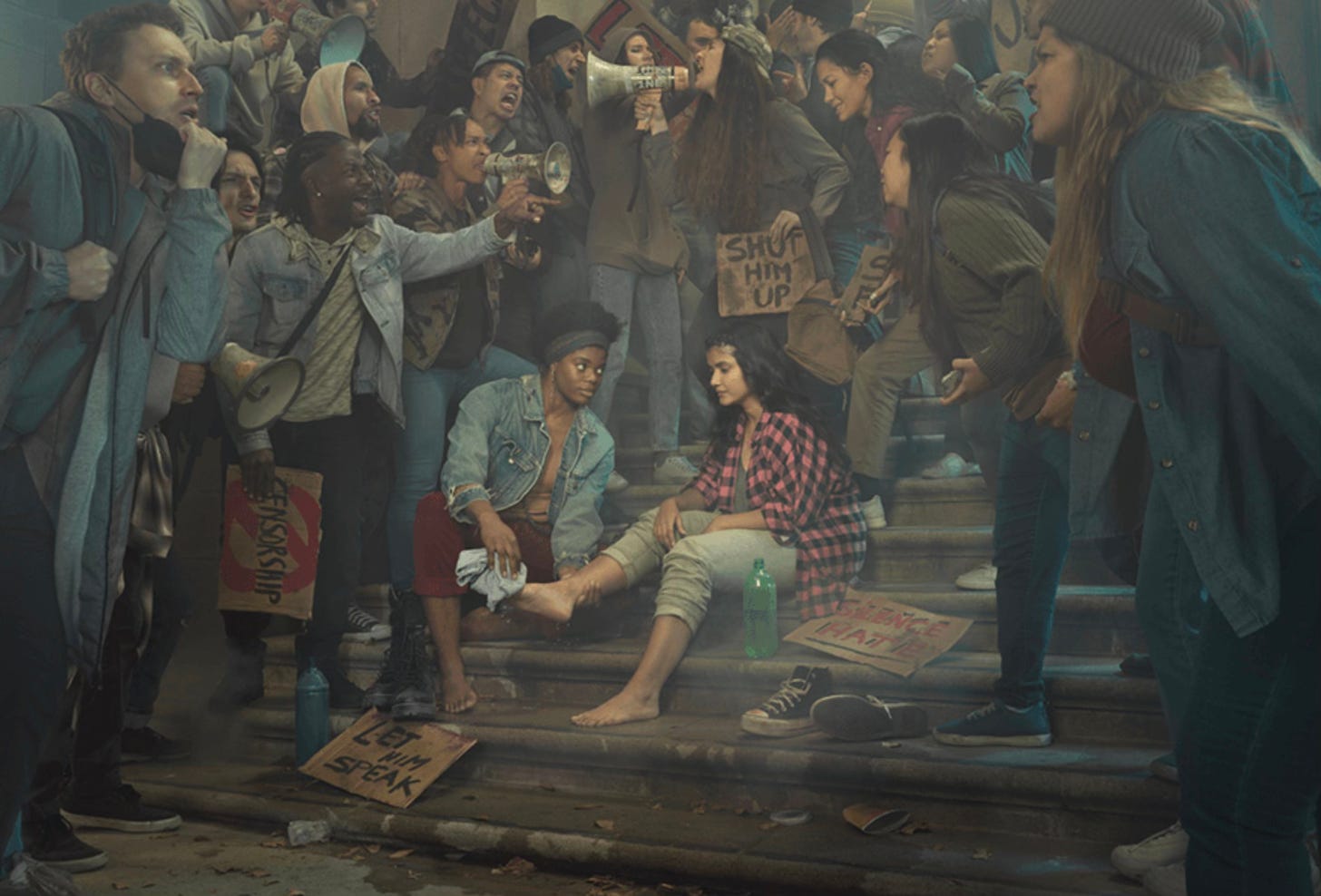Love in the time of multimillion dollar Super Bowl ad buys
On "He Gets Us," a marketing campaign that is not for me, but that I can't get out of my head
Top notes:
I haven’t done one of these prefaces in a while, so my apologies for saddling you with a particularly sappy paragraph here. I’ll admit, I’ve been in my own head more than I’d like lately (classic ego and fear stuff: about putting The Right Kind of White out into the world, about the sustainability of this professional project, about the whole laundry list of insecurities that often gum up the works for me). One of the gifts of getting to write this newsletter— in public, for a community I treasure— is that it’s a pretty good salve for those overly naval-gaze-y moments. While I hope this essay is useful for you all, what I know for sure is that it was uniquely helpful for me to write. When I started it, I was in my own head, far more than I’d like. When I finished, I was much more focused on the world that I know we’re all trying to build. This is all to say— thank you, sincerely, for all the ways you support and enable my work. I hope, sincerely, that it’s useful for you as well.
I didn’t expect to still be thinking about the Jesus commercial. It was a big budget Super Bowl ad, the ultimate in empty calories. Why do Super Bowl commercials exist? To sell things, of course. But besides that, to offer an otherwise balkanized nation something to talk about for exactly twenty four hours after the game and not a minute longer. It’s all just morning drive radio fodder, one more quick fire topic to be tossed off and then forgotten once the work week begins. “Did you see ______ ad?” is as wispy and temporal a question as “Usher’s pretty good at roller skating, huh?” or “Wow, Travis Kielce looked really angry yelling at Andy Reid… do they have, ahem, ‘Bad Blood?’” And bless the brands for that gift. I’m all for making small talk a little easier, even for a single Monday morning. Everybody knows that you don’t keep talking about the ads on Tuesday, though.
But, in spite of my better instincts, I’m still thinking about the Jesus ad. You likely know the one. It was this year’s contribution from the mysterious team of Christianity boosters over at “He Gets Us.” It was about feet washing. More on that in a second. But first, some backstory. The He Gets Us team holds their identities fairly close to the chest, but it’s clear that the Green family— they of Hobby Lobby fame— are heavily involved, both through patriarch David’s money and son Mart’s role on the organization’s three-person board. The Greens are conservative Evangelicals who have supported (both in funding and in deed) a long line of anti-abortion and anti-LGBTQIA efforts. While the campaign has recently been moved to an independent nonprofit, it was originally housed under the Servant Foundation. Another major Servant Foundation grantee, the far-right Alliance Defending Freedom, has officially been classified as a hate group by the Southern Poverty Law Center. You don’t have to be an hard-nosed gumshoe to connect the dots here.
Like the crew behind He Gets Us, I too am a person of faith, though my theology is so far on the leftist fringe of Christianity that I’m sure there are plenty of other Christians who’d consider me an apostate. As far as Jesus stories go, I’m not as into the feet washing one as I am the one about overturning the money tables, but that doesn’t mean I’m not a fan (love! humility! hygiene!). He Gets Us and I can agree on that one. It’s just that I care about a lot of people who have been profoundly hurt by the kind of Christian communities that fund campaigns like theirs, so it’s hard for me to trust their intentions, even when they’re pulling from bleeding-heart-friendly scripture passages.
That leads me to the second reason why I’m surprised I’m still thinking about these ads. They’re not exactly hard to critique. We’re talking about hundreds of millions of potentially better-spent dollars (what size ad buy would Jesus make?), and all for an initiative whose vague message of social justice is undermined by the ways that the wizards behind the curtain have made Queer, trans and women’s lives worse. And what’s the message? That love is all you need? That Jesus wants you to be really, really into him (huh, not exactly consistent with the humility inherent in feet washing, but what do I know, I had a crisis of faith right before matriculating to seminary)? That systemic injustice can be undone through individual acts of compassion and kindness? I could critique all that with one hand tied behind my back.
I mean, watch me cook:
Hey, wealthy Christian ad guys, are you telling me that the real solution to the inherent structural violence of American policing is for one cop to wash a single Black guy’s feet?
And that the climate crisis will be magically resolved if an oil field roughneck takes time out of his day to clean some dusty environmentalist toes?
Or that some good mid-protest scrubbing is all it takes to patch up the conflict that has most bedeviled America (“Shut Him Up!” vs. “Let Him Speak!”)?
An aside: Whoever “he” is, I hope that, after everybody’s feet were properly cleaned, that the two sides hammered out a fair-minded compromise (presumably allowing him to speak, but with every other word replaced with a blank, Mad-libs style).
The ad goes on. If you haven’t seen it, there are way more images where those came from. All of the major icons of our divided times are represented: A Queer person and a priest. An abortion seeker and an anti-abortion protestor. A migrant mother and a White suburban lady. There’s even a preppy teen and a punk. Finally! The two figures most responsible for gridlock in Washington!
Now, would I prefer it if all the parties involved stopped exfoliating one another’s toes and started throwing punches? Not at all. But it’s easy to identify what’s missing from the equation here: Reparations. Structural change. Any acknowledgment of power whatsoever. And because the ad is so self-evidently critiquable, that should be that. I should be able to shake my head disapprovingly, laugh at the overwhelming foot-centeredness of it all and go back to my life.
But I am still thinking about the ads. Quite a bit actually. I’m fascinated not by whether they’re bad or good but the fact that they exist in the first place. This is a branding effort, after all. The effort’s current CEO used to lead marketing for Dominos and Wendy’s. He cut his teeth convincing America that it was a good thing that Dominos used to be terrible at making pizzas because they eventually learned their lesson. It’s clear that everybody involves understands target audiences and messaging and segmentation. They’re not just doing this for kicks.
All that means that the question of whether or not the ads appeal to me is besides the point, as is the parallel question of whether these ads are beloved by the existing conservative evangelical base (interestingly enough, many members of that community are also really angry at He Gets Us, on account of the ads being too woke). Neither of us are the intended audience here. Per the organization itself, the entire campaign targets young people who are currently skeptical of religion but are searching for a way of making sense of the world. And like any seasoned marketers, He Gets Us has focus grouped the heck out of those hip, young unchurched masses to see what makes them tick.
We’ve done a lot of homework on our culture… [and] this is what we’ve learned: From politics to sexuality and religion, so many of us feel like our values, beliefs, and identities are under attack by the ideological “others” around us. Many perceive those who differ with them on issues of justice, dignity, and humanity as not just wrong or misguided but also as evil. As enemies. We often see these “others” as close-minded, selfish, hypocritical — and if we’re honest, many of us respond in kind.
I’m not surprised that’s what He Gets Us found in their focus groups. Poll after poll shows that Americans are concerned about our isolation and polarization; in fact we consistently assume larger ideological divides on key issues than actually exist in practice. I haven’t met anybody, on any side of the political aisle, who is feeling great about the state of American political rhetoric. I mean, I’m pretty riled up about the general topic myself, (though I’d frame it less as a problem of polarization and more of an issue of atrophied organizing and outreach muscles on the left).
But still, surprising or not, it’s revealing that “He Gets Us” chooses polarization as the starting point for their project of winning Gen Z for Christ. While far-right critics may bristle at what they view as overly-humanizing depictions of Queer people, the series isn’t trying to actually change material conditions for those on the losing end of current power dynamics. It’s seeking to take the temperature down a few notches, to create a world where those of us who don’t experience regular threats to our humanity can go about our lives with fewer reminders of other people’s suffering.
If this is the great sin of the “He Gets Us” campaign, it at least has plenty of company. It isn’t the only contemporary institution that, when given the opportunity to afflict the comfortable and comfort the afflicted, opts instead for narcotized reassurance. For all its faults, at least the Jesus marketers put unhoused people and migrants in the foreground of the ads.
Compare the relative humanization of He Gets Us to the pure volume of articles in our nation’s publications of record that focus not on the plight of our neighbors on the street or families that have traveled thousands of miles to a new country, but instead on the horrors faced by privileged people who… occasionally have to witness the presence of marginalized people in their midst. Or alternately, compare it to all the articles that talk about Gaza not through the lens of the thousands killed and the millions displaced, but about that war’s potential impact on Joe Biden’s popularity. Or the tsunami of post-2020 coverage about out of control criminals supposedly emboldened by the “defund the police” movement compared to the scant attention paid to the fact that police killed more people in 2023 than in any year prior.
For all the ways that I likely disagree with the theology of He Gets Us, that campaign is merely a symptom of a broader rhetorical trend. We live in a world where, thank goodness, it is much harder to ignore those whose pain is most profound. There’s an amazing opportunity there— for love and interconnectedness, to be sure, but also for reckoning and repair. The temptation, however, is to turn away, to view that increased awareness of other people’s humanity not as an invitation but a threat. And as much as my liberation-theology-loving self would love to pull out a self-satisfied “What Would Jesus Do?” here, I’ll try to resist the urge to meet somebody else’s crafting of God in their image with my own.
Instead I’ll offer this.
Love is a tricky emotion. It’s easy to convince ourselves that we’re motivated by love when what we’re actually craving is the flattery of a frictionless existence. It’s much harder to actually love other people, to do so for those we don’t even know. And it’s tremendously difficult to love when doing so requires discomfort, risk and sacrifice.
Personally, I’ve got far more questions about faith than I do answers. I definitely don’t have any theological commitment that would justify a half a billion dollar ad budget. But I would like to live in a more loving world. So too would I like to act in more loving and generous ways— both individually and societally. And I have a hunch that the path to both of those aspirations requires more rather than less attention on all the ways that our world causes pain. Some days, it may call for individual compassion and acts of direct service. Other days, it’ll beg for protest and disruption and a fair bit of hell raising. Every day, it’ll require me to resist the urge to turn away, to claim that mere sympathy is enough, to offer platitudes when what solidarity demands is action and agitation.
End notes:
Just to tie this up the way I began it, thanks for all the ways y’all keep this project humming— through paid subscriptions, sharing with friends, writing comments, sending me emails, pre-ordering the book, offering feedback, and just generally reminding me that you’re out there. As for song of the week, would I have been more sympathetic to He Gets Us if they had used their Super Bowl time slot to play Kris Kristofferson’s “Jesus Was a Capricorn” in its entirety? Is it really that easy to pander to me? Probably. Hell of a song, though.
Oh, while we’re talking about Kristofferson, have you heard the story about his mentor at Pomona College, one Dr. Frederick Sontag? When we talk about “loving your neighbor” not as a trite nicety, but as an actual challenge, this is a hell of an example.
As always, the song of the week playlist is on both Apple Music and Spotify.
Finally, IT’S PACZKI DAY, friends! I’m not Polish, but I love fried dough, the Rust Belt, and food-based ethnic holidays. Get after it, my friends. I don’t even care if you’re the kind of person who scoffs that “they’re just jelly donuts.” Even haters deserve to have a happy paczki day. So rise up South Milwaukee. Rise up Hamtramck. Rise up Western New York. It’s time to make the paczki.










THIS LINE IS POWERFUL: "It's easy to convince ourselves that we're motivated by love when what we're actually craving is the flattery of a frictionless existence."
Thanks for writing this. I'm in a faith community that is currently struggling with some huge and uncomfortable transitions, and reading this is helping me clarify my thoughts. I love these stupid fallible beautiful people so much and also I'm so angry at those stupid fallible beautiful people that are in leadership positions right now. They are meeting this moment (or ten) of struggle with fear instead of curiosity, and want to smooth my/others' anger over instead of take any accountability for the systemic reasons for all the anger. Every time this crisis has come to some sort of breaking point, my response has been to figure out how to package/present my anger in a way that will somehow facilitate change without further threatening fearful leadership and guess how well that's working?
So, I'm going to go eat Fastnacht pancakes with them tonight and see the silliest of silly talent shows (my son is going to do a Kung-Fu demonstration of what he's learned in 6 months of weekly classes and it will be AMAZING and I predict a lot of flailing), and then tomorrow remember that we're all (star) dust with them, and a week from tonight show up at the leadership meeting with the metaphorical bullwhip. COMMUNITY is so EFFING HARD.